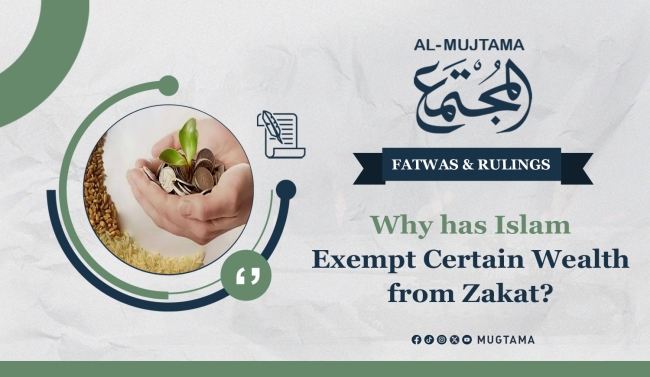Islamic legislation has carefully exempted certain types of wealth from zakat (almsgiving), such as fixed assets, wealth that has not reached the nisab (minimum amount upon which zakat is due), or wealth that has reached the nisab but a hijri year has not yet passed on it, among other types. This exemption aims to enable production and investment, fulfill human needs, and respect human nature while guiding its course. This is evident in the following:
First: The Ability to Invest and Produce:
Islamic legislation exempts fixed assets from zakat. The Quran retains the description of the poor for those who own a ship and earn their livelihood through it, as Allah says, “As for the ship, it belonged to poor people working at sea.” (Al-Kahf: 79) Owning the ship did not exclude them from being considered poor, entitled to receive zakat, and not obliged to pay zakat on the fixed asset that helps them earn their livelihood. Allah also says, “Or a needy person in misery.” (Al-Balad: 16), indicating that owning land does not disqualify someone from being considered needy if it does not fulfill all their needs.
Islamic legislation has established that wealth converted into productive capital assets is not subject to zakat on the asset itself but rather on the income generated from it. This preserves wealth that has become productive assets, thus serving its owner and the community, achieving high economic efficiency by maintaining productive assets in society without forcing the owner to sell them to pay zakat. (1) These assets form the basis of economic projects, generating profit by relying on them.
Therefore, not imposing zakat on capital assets helps maintain the productive capacity of the economy and promotes investment and production, thus achieving the general benefit for the members of society. Exempting productive assets from zakat encourages people to convert their idle wealth into productive capital assets, which pay zakat on the income generated from them. In this way, the wealth owner benefits, society as a whole benefits, and its poor benefit in particular. (2)
If financial assets are free from demands that reduce their value and decrease their amount, this preserves the fundamental capacity of economic projects and encourages investment and production through them.
Second: Providing for Human Necessities:
Islam categorizes wealth regarding zakat obligation into growing and non-growing wealth. Zakat is obligatory on growing wealth, while non-growing wealth, intended for use and not for sale (known as fixed assets), such as real estate, furniture, equipment, and vehicles, is exempt from zakat. (3) Scholars base this on the Prophet’s saying: “No Zakah is to be paid on one’s horse (that he rides) or one’s slave,” (4) a fundamental principle that fixed assets are not subject to zakat.
Scholars have confirmed that there is no zakat on working camels and cows as they are likened to slaves and belongings, (5) meaning no zakat is due on them if they serve their owner and are not for trade.
Islam also stipulates that zakat is obligatory only on wealth exceeding essential needs such as food, drink, clothing, housing, and transportation. Therefore, a person’s home, vehicle, household appliances, and similar items are not subject to zakat, preserving these essential assets necessary for one’s life. (6)
This approach eases people's financial obligations and considers their circumstances, unlike some secular systems that impose taxes on all income, prompting tax evasion to maintain a decent standard of living.
Third: Regulating Behavior to Align with Human Nature:
Islamic legislation considers human nature through the obligation of zakat by exempting certain types of wealth, such as jewelry women uses for adornment, from zakat. This exemption has significant purposes, evident in two aspects:
- Ease and Consideration for Recreational Aspects: Women’s nature inclines towards adorning themselves with gold and silver. Islam allows this within certain limits, provided if they are not evading zakat by hoarding gold and silver.
- Regulating Behavior to Match Nature: Islam exempts women’s jewelry from zakat in respect of their nature. However, if a woman possesses jewelry that is not permissible, such as men’s jewelry (e.g., sword decorations), it is prohibited, and zakat is due. (7)
In order to regulate human nature, Islam also made zakat obligatory on men's jewelry, as adorning oneself with it is not in accordance with human nature but contradicts it. This also applies to utensils made of gold and silver or using them as antiques. Hence, we can say that zakat has been employed to correct human nature. It has been used to compel men to return to their natural state and to align human behavior with the correct innate nature.
-------------------------------------------------------------
- Legislative Miracles in Zakat: Dr. Rifaat Al-Sayed Al-Awday, p. 21.
- Ibid, p. 4.
- Miracles in Zakat Legislation: Dr. Kawthar Al-Abaji, p. 248.
- Agreed upon: Reported by Al-Bukhari (1395) and Muslim (982).
- The Book of Revenue: Abu Ubayd Al-Qasim bin Salam, p. 543.
- Legislative Miracles in Zakat: Dr. Rifaat Al-Sayed Al-Awday, p. 13.
- Fiqh Al-Zakah on Wealth and Body: Sheikh Abdul Razzaq Nasir Muhammad, p. 43.


